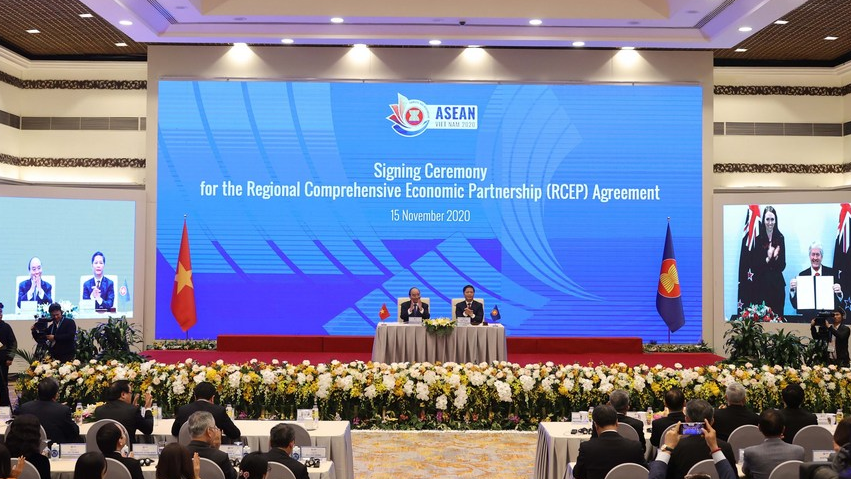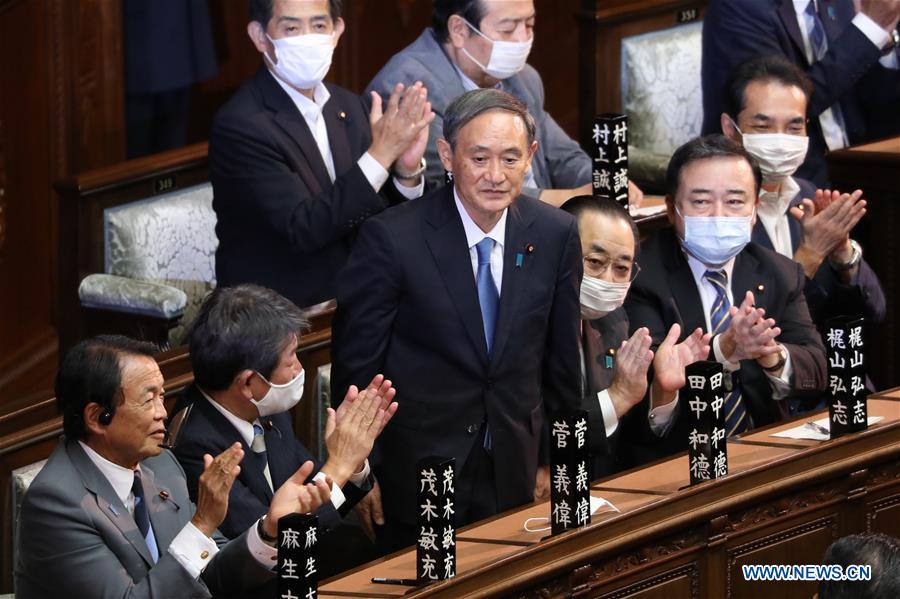
The signing ceremony of the Regional Comprehensive Economic Partnership (RCEP) agreement is held via video conference in Hanoi, Vietnam, November 15, 2020. /Xinhua
The signing ceremony of the Regional Comprehensive Economic Partnership (RCEP) agreement is held via video conference in Hanoi, Vietnam, November 15, 2020. /Xinhua
Editor's Note: Andrew Korybko is a Moscow-based American political analyst. The article reflects the author's views and not necessarily those of CGTN.
On Sunday, 15 countries just agreed to create the world's largest free trade zone by inking the Regional Comprehensive Economic Partnership (RCEP).
This new economic bloc comprises the 10 states of the Association of Southeast Asian Nations (ASEAN), Australia, China, Japan, New Zealand, and the Republic of Korea. The brainchild of Beijing aims to bring these countries closer together in pursuit of mutually beneficial trade relations between them.
It also deals a fatal blow to the U.S.'s efforts to create artificial divisions between them through its former Trans-Pacific Partnership (TPP) that U.S. President Trump pulled out of as one of his first acts of office in January 2017.
Not only did China cement its role as the guardian of globalization amid these turbulent economic times across the world, but it also took the wind out of the Quad's anti-Chinese sails.
The U.S. had hitherto been doing its utmost to turn its Australian, Indian, and Japanese allies against China through the establishment of a trans-regional military bloc which observers warned might have anti-Chinese strategic intentions.
Those efforts are now foiled after two of the Quad's members, Australia and Japan, decided to put their past differences with China behind them by agreeing to the RCEP.
Immense credit is owed to the Australian and Japanese leaders for their decision. China's relations with those two had been troubled over the past few years, but all parties realized that they have more to gain by cooperating with one another than competing.
This is especially true for new Japanese Prime Minister Yoshihide Suga who could have theoretically broken with his predecessor upon replacing him a month after the latter's sudden resignation in August, but he instead decided to continue his pragmatic outreaches to China. This stands in contrast to India, however, which pulled out of negotiations of the RCEP last year.

Yoshihide Suga (C) stands after being elected as Japan's new prime minister, Tokyo, Japan, September 16, 2020. /Xinhua
Yoshihide Suga (C) stands after being elected as Japan's new prime minister, Tokyo, Japan, September 16, 2020. /Xinhua
In hindsight, the South Asian state made a grand strategic mistake by doing so, though one which all parties accept was its sovereign right to make.
India had seemingly been betting on Trump's re-election which might have been one of the reasons why it declined joining the RCEP. Had Trump been certified as the next U.S. president, which might still theoretically happen however unlikely it may appear, then India would have been elevated as the front line state for "containing" China.
Biden, however, doesn't harbor the same hostile intentions towards China as Trump does, and in fact it's quite possible that he might seek to enter into a new detente with it.
Should that positive scenario come to pass and a comprehensive trade deal between the world's two largest economies is clinched during his possible presidency, then India might end up economically isolated and compelled to pragmatically cooperate with the RCEP despite previously gambling that it could hold off on doing so.
Trump wanted to reach a free trade pact with the South Asian state, but no progress was made, and Biden might just abandon that policy.
Thus, the current state of grand strategic affairs is that the RCEP powerfully took the wind out of the Quad's anti-Chinese sails.
That emerging military bloc can no longer have any implied anti-Chinese purpose since half of its members — Australia and Japan — just committed to the long-term multilateral betterment of economic relations with China.
This makes it extremely unlikely that they'd militarily provoke it at the urging of any external actor like the U.S.
India was misled by Trump into worsening bilateral relations with China all across the past year, but it might now realize what a mistake that was and consider a rapprochement with it.
Irrespective of India's possible partnership with the RCEP sometime in the future, the fact of the matter is that the U.S.'s anti-Chinese regional plans have failed.
Even if Trump ends up reversing the projected results of the election, he'll be unable to rely on the Quad for "containing" China, which the U.S. and India can't do alone.
This makes the establishment of this massive trade pact a game-changing development for global geopolitics since it proves that the pursuit of pragmatic and mutually beneficial economic relations takes precedence over provocative self-interested military designs.
Thus, strategic stability has been restored to the Asia-Pacific region.
(If you want to contribute and have specific expertise, please contact us at opinions@cgtn.com.)

